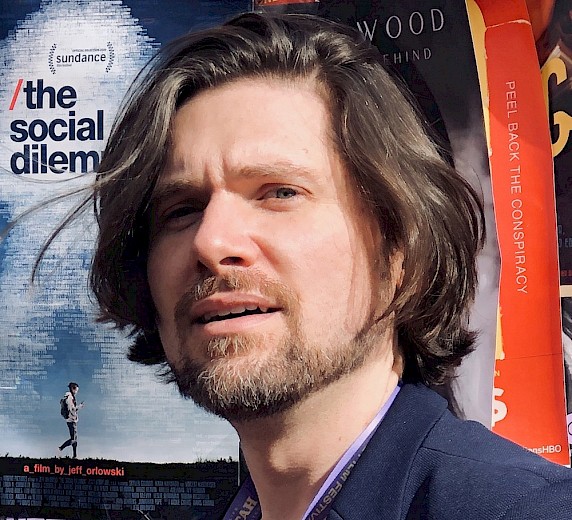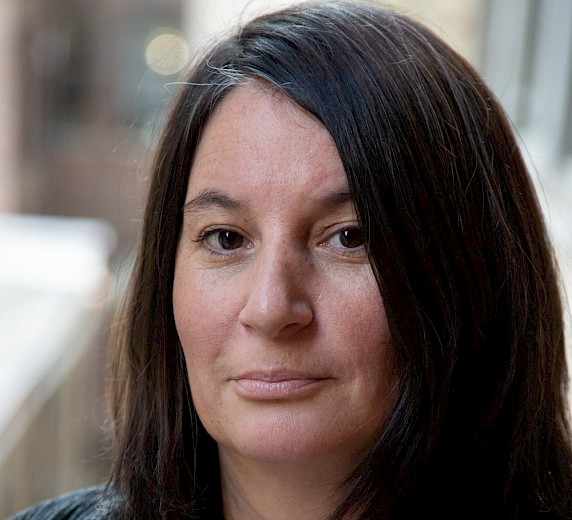International Panel (english)

Welcome to Chechnya: How a Documentary Uses Deepfake Technology to Protect its Protagonists
So-called „deepfakes“– digitally manipulated or artificially created faces and voices that appear deceptively real – have been a hot topic for a few years now because of the ominous role they will play on the propaganda front in the near future. Enormous progress in the field of artificial neural networks already makes it possible to generate disturbingly realistic deepfakes today.
Every technological advance brings with it both dangers and opportunities – and the film team of Welcome to Chechnya has seized the opportunities. The documentary, which won the Panorama Audience Award at the Berlinale 2020, deals with the systematic persecution, torture and murder of homosexuals and transgender people in today's Chechnya – both by the state and by fanatical family members. The film follows the efforts of Russian LGBTQ activists who help the victims, and those at risk, flee to a shelter in Moscow. From there, they try to organize asylum in another country.
There was a need to hide the identity of almost all the film's protagonists, because they remain in danger even in a supposedly safe foreign country. In a process that encompassed an entire year, VFX specialist Ryan Laney developed a method that he calls a „face veil“: With the help of volunteers who offered their own face as a substitute, the protagonists' facial features were digitally replaced – no matter how variable the source material was in terms of quality, movement and lighting conditions. This pioneering achievement of
Welcome to Chechnya has distinct advantages over other concealment methods, because the viewer retains an intimate sense of the protagonists' emotions.
The panel will focus on the editing and visual effects work of this groundbreaking documentary with four guests: producer Alice Henty, VFX supervisor Ryan Laney, additional editor & postproduction supervisor Maxwell Anderson, and film editor Tyler H. Walk, who won an editing award for Welcome to Chechnya at this year's Sundance Festival. The moderator is Dietmar Kraus.
Due to Corona, the panel will be recorded before the festival and made available to both accredited and online ticket buyers at https://edimotion.onlinefilmfestival.de from 23 – 30 October. Duration: 103 min.
GUESTS

Tyler H. Walk
Film Editor
After graduating with a BA in Film and Video Production from Penn State University in 2006, Tyler Walk enrolled in a six-week course called „Art of Editing“ at The Edit Center in New York, which he credits with setting him up for a career as a freelance film editor. He has specialized in documentaries. Some of his recent projects before Welcome to Chechnya include Sara Taksler’s Tickling Giants (2016), Michael Moore’s Where to Invade Next (2015), Eric Weinrib's Roseanne for President! (2015), and David France’s Oscar-nominated documentary How to Survive a Plague (2012). For the editing of this film Tyler Walk won a Cinema Eye Award and was nominated for an Emmy. With Welcome to Chechnya he won the Special Jury Award for Editing at Sundance 2020. Currently Tyler Walk is directing his first feature about the Small-World Phenomenon

Maxwell Anderson
Additional Editor and Postproduction Supervisor
Based in Queens, NY, Maxwell Anderson is a documentary editor. He has edited the award-winning feature films No Fear No Favor and The Only Real Game by director Mirra Bank, the latter featuringOscar-winning actress Melissa Leo. He was additional editor on David France's Welcome to Chechnya which took home the award for best editing of a U.S. Documentary at the 2020 Sundance Film Festival. After graduating from New York University with a BFA in Cinema Studies, he started out in production on films by Jonathan Demme, Gus Van Sant, Mike Nichols, and Steven Spielberg. He has worked as assistant editor with filmmakers Tia Lessin and Carl Deal (Citizen Koch), Tanaz Eshaghian (Love Crimes of Kabul), and Hava Beller (In the Land of Pomegranates), among others. He has assisted acclaimed editors Mary Lampson, Victor Livingston, Jonathan Oppenheim, Nancy Baker, and Jean Tsien during his career.

Ryan Laney
VFX Supervisor
In his long career, Ryan Laney has developed effects for companies like Manex Entertainment, Industrial Light and Magic, Digital Domain, and Sony Pictures Imageworks. For Manex, he developed an efficient rendering workflow for the Matrix franchise. At ILM, he worked on the crowd and rendering pipeline for Harry Potter and the Chamber of Secrets (2002), designed effects animation tools for Men In Black II (2002), and wrote custom cloud renderer and animation tools for Hidalgo (2004). At Digital Domain, he liaised between software and effects departments to shepherd NYC flooding work for The Day After Tomorrow (2004). At Sony, he developed a realistic water system for The Aviator (2004), built cross department tools for G-Force (2009) and Green Lantern (2011), and was involved with the design of what are now industry standard tools and workflows. He authored a master class based on a modular destruction system he wrote for Zathura (2005) and was nominated for an Annie Award for his development of an interdisciplinary suite of tools to build, animate, and render goo in Spider-Man 3 (2007). On the back of his groundbreaking work on Welcome to Chechnya, Ryan Laney has founded his own visual effects company called Teus Media.

Alice Henty
Film Producer
Born 1972 in Holmfirth, Yorkshire, Alice Henty mainly grew up in Cornwall in the UK, but also lived in other places like San Francisco and Jamaica. She graduated with a BA in Media Studies & Theater Arts from Middlesex University in 1995. Her start in the film industry was at a stop motion animation company, where she worked in the production, art and camera departments. Moving on to narrative features, she worked as a production assistant at Figment Films on projects like A Life Less Ordinary (1997).
Alice Henty’s career in producing feature documentaries began with the Academy award winning One Day in September (1999). Her most recent film before Welcome to Chechnya was The Work (2017), which won the Grand Jury prize at SXSW Film and the Audience Award at Sheffield Doc/Fest. Other credits include Sky Ladder, Happy Valley, Citizen Koch, Beware of Mr. Baker, Buck, and The Tillman Story. In 2016 she founded Maylo Films together with Paul McGuire in order to produce character-led, verité projects. Alice Henty is a Sundance Creative Producing Fellow, a member of the Documentary Producers Alliance (DPA), the Producers Guild of America (PGA), and the documentary branch of the Oscar Academy (AMPAS).